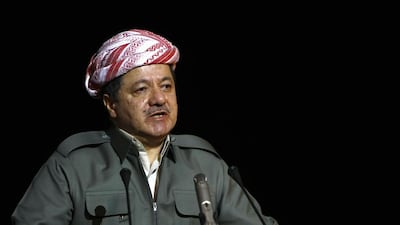Last week’s call by Masoud Barzani, president of Iraqi Kurdistan, for a referendum on independence for the autonomous region makes little sense from a nationalistic point of view.
His first announcement of a referendum, in July 2014, followed considerable Kurdish territorial expansion amid turmoil in Iraq due to lightning advances by ISIL and the subsequent near-collapse of the national army. The most important of those Kurdish gains was the capture in the previous month of the oil-rich city of Kirkuk, which is hotly contested by Iraqi Arabs, Kurds and Turkmen.
As such, Mr Barzani’s announcement back then was made from a position of relative strength. However, the idea was shelved in November 2014 following important gains by ISIL, including coming close to Erbil in August that year.Last week’s resurrection of plans for a referendum does not correspond to a rise in Iraqi Kurdish fortunes. ISIL continues to be a major threat despite recent setbacks, Iraqi Kurdistan’s economy is suffering badly from plummeting oil prices, and there have been protests over Mr Barzani remaining in office despite his tenure as president – which has lasted 11 years – expiring in August 2015.
However, it is precisely these difficulties that are driving his renewed call for a referendum. This time, it is not about realising national aspirations, but about Mr Barzani ensuring his political survival by diverting attention away from domestic political and economic problems to a historically popular cause.
The fact that he has said a referendum would be non-binding is indicative of the hollow nature of his stated intention of achieving independence. Mr Barzani said the purpose is “to know the will and opinion of the Kurdish people about independence”, but strong public support in this regard has long been common knowledge.
He may be banking on reaping the rewards of being seen to be pushing for statehood, without the risks of actually achieving it. However, this in itself is a major gamble, as it may incur the wrath not only of powerful neighbours who are strongly opposed to Kurdish independence, but also of a Kurdish public that may see this as Mr Barzani exploiting a national cause for political gain.
He may be counting on division among Iraqi Kurdistan’s neighbours, as well as the fight against ISIL, muting the backlash against a referendum. He may also be hoping that the region has come to accept a fait accompli, however grudgingly, given that Iraqi Kurdistan has been cultivating its autonomy since 1991. However, in so doing, Mr Barzani may be underestimating regional opposition to Kurdish moves towards independence, which transcends regional divisions. Arabs, Iranians and Turks are generally hostile to the idea of a Kurdish state because besides dividing Iraq, it could raise secessionist sentiments among the Kurds of Turkey, Syria and Iran. Such hostility has been raised further by the insistence by Iraqi Kurdish officials that Kirkuk and other newly captured territories be included in such a state, by abuses against non-Kurdish civilians in territories captured from ISIL, by Syrian Kurds’ territorial expansion and declarations of autonomy, and by the recent resumption and escalation of the Kurdish insurgency in Turkey.
The peoples of the region are also generally hostile to Israel – the only country in the region to support Kurdish independence – and hence to the prospect of an Israeli-Kurdish alliance. Opposition to Kurdish statehood is not only based on the territorial integrity of Iraq, Syria, Turkey and Iran, but also economic prosperity, as the areas where Kurds are predominant are resource-rich, particularly in terms of energy and agriculture.
Mr Barzani has said Iraqi Kurdish statehood does not need anyone else’s blessing, but in reality the economic viability of this landlocked territory is largely dependent on the acquiescence of neighbours who say they will not countenance such a development. Turkey in particular is economically vital to Iraqi Kurds, whose key ally the United States is strongly in favour of a unitary Iraqi state. Iraqi Kurds cannot afford to alienate their neighbours and partners.
A referendum will also complicate and potentially hinder the fight against ISIL, to the detriment of Iraqi Kurds themselves, whose ground forces are among those at the forefront of such efforts. The jihadist group may gain more recruits if it is seen, or portrays itself, as a vanguard against Kurdish independence.
In addition, it is by no means certain that the US – to whom Iraqi Kurds owe their autonomy – would support a Kurdish state if it meant antagonising Turkey and Iraq, both crucial regional allies of Washington.
Mr Barzani’s referendum call may even push Ankara and Baghdad to lobby against further western military aid to Iraqi Kurds to fight ISIL, not least because of suspicions that such weaponry could also be used in pursuit and defence of independence. Turkey is currently doing so with regard to Syrian Kurds.Mr Barzani may be banking on the symbolism of a non-binding referendum calming regional reaction.
However, this very symbolism – in addition to the previous referendum that never materialised – may anger segments of his own population who see hollow promises without follow-through. As such, he is placing himself between a rock and a hard place, and risking further domestic and regional instability in the process.
Sharif Nashashibi is a journalist and analyst on Arab affairs

